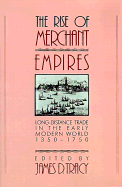Book contents
- Frontmatter
- Contents
- Preface
- Maps
- Introduction
- 1 Structural changes in European long-distance trade, and particularly in the re-export trade from south to north, 1350–1750
- 2 The growth and composition of trade in the Iberian empires, 1450–1750
- 3 The growth and composition of the long-distance trade of England and the Dutch Republic before 1750
- 4 France, the Antilles, and Europe in the seventeenth and eighteenth centuries: renewals of foreign trade
- 5 Productivity, profitability, and costs of private and corporate Dutch ship owning in the seventeenth and eighteenth centuries
- 6 The Dutch and English East India companies compared: evidence from the stock and foreign exchange markets
- 7 World bullion flows, 1450–1800
- 8 Merchant communities, 1350–1750
- 9 Economic aspects of the eighteenth-century Atlantic slave trade
- 10 Marginalization, stagnation, and growth: the trans-Saharan caravan trade in the era of European expansion, 1500–1900
- 11 The “decline” of the central Asian caravan trade
- 12 Merchant communities in precolonial India
- 13 Merchants without empire: the Hokkien sojourning communities
- Index
4 - France, the Antilles, and Europe in the seventeenth and eighteenth centuries: renewals of foreign trade
Published online by Cambridge University Press: 01 June 2011
- Frontmatter
- Contents
- Preface
- Maps
- Introduction
- 1 Structural changes in European long-distance trade, and particularly in the re-export trade from south to north, 1350–1750
- 2 The growth and composition of trade in the Iberian empires, 1450–1750
- 3 The growth and composition of the long-distance trade of England and the Dutch Republic before 1750
- 4 France, the Antilles, and Europe in the seventeenth and eighteenth centuries: renewals of foreign trade
- 5 Productivity, profitability, and costs of private and corporate Dutch ship owning in the seventeenth and eighteenth centuries
- 6 The Dutch and English East India companies compared: evidence from the stock and foreign exchange markets
- 7 World bullion flows, 1450–1800
- 8 Merchant communities, 1350–1750
- 9 Economic aspects of the eighteenth-century Atlantic slave trade
- 10 Marginalization, stagnation, and growth: the trans-Saharan caravan trade in the era of European expansion, 1500–1900
- 11 The “decline” of the central Asian caravan trade
- 12 Merchant communities in precolonial India
- 13 Merchants without empire: the Hokkien sojourning communities
- Index
Summary
Thanks to the dynamism of merchant communities along the Atlantic coast and to the exploitation of a young colonial empire, French foreign trade expanded during the eighteenth century. This expansion was based upon the growth in the Antilles trade, which was in turn based upon the mastery of European markets in the re-export of colonial products. The tempo of this growth is estimated to have been greater than that of its rivals – in particular, English commerce. F. Crouzet notes that despite the setback dealt by the collapse of Law's system, French commerce at first grew at a tempo nearing that of English commerce. However, beginning about 1735 it exhibited a more rapid and precocious acceleration that doubled its value in less than seventeen years: from 221 million livres in 1735 to more than 500 million in 1752–4. In Crouzet's words, the years 1735–55 were the golden age of French commerce. Indeed, during the next twenty years, until the American War of Independence, this commerce continued to grow (notwithstanding a clear tapering off caused by the Seven Years' War), although at a slower rate; trade values reached a peak in 1777. On the eve of the American War of Independence, trade remained less than 750 million livres. Not until after the war did an unmistakable recovery occur, which carried trade to its record level on the eve of the French Revolution. Figure 4.1 shows this growth clearly.
- Type
- Chapter
- Information
- The Rise of Merchant EmpiresLong Distance Trade in the Early Modern World 1350–1750, pp. 153 - 173Publisher: Cambridge University PressPrint publication year: 1990
- 8
- Cited by



